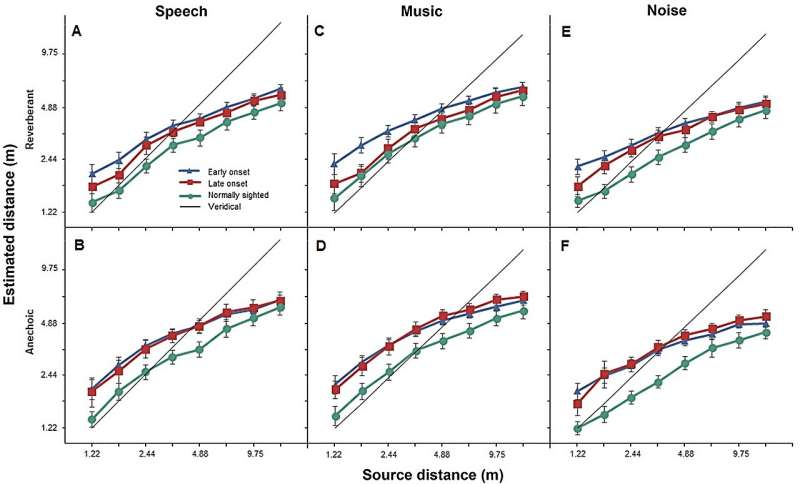This article has been reviewed according to Science X's editorial process and policies. Editors have highlighted the following attributes while ensuring the content's credibility:
fact-checked
peer-reviewed publication
trusted source
proofread
Study finds people who lost sight early in life are less accurate at estimating auditory distances

New research has found that people who experience partial vision loss in early childhood find it more difficult to accurately judge the location of a sound than those who lose sight later in life.
People with vision loss rely heavily on their other senses for path planning, safe navigation, avoiding collisions and general day-to-day living.
The new study, led by Anglia Ruskin University (ARU) in collaboration with the University of East Anglia (UEA), was published in the journal Optometry and Vision Science and is the first to compare how people with early (before the age of 10) and later onset vision loss judge the distance of sound.
The study involved 52 participants under 33 years old. Each participant took part in 480 separate trials, which involved estimating the distance of each sound. The sounds were emitted from distances ranging from 1.2m to 13.8m away and varied between speech, music, or noise. Participants estimated the distance the sound came from. Each participant took part in 480 trials over an hour and 40 minutes.
The differences in estimations between people with early and late onset vision loss, as well as a fully-sighted control group, was greater for closer distances than for sounds coming from further away.
Compared to the control group, people with early-onset vision loss tended to judge that sounds played from close distances, up to five meters, were actually coming from further away.
Distance judgements were not found to be significantly different between the control group and those with late-onset vision loss.
Lead author Professor Shahina Pardhan, Director of the Vision and Eye Research Institute at Anglia Ruskin University (ARU), said, "These results suggest that people who suffer vision loss at birth or in early childhood are more likely to struggle to accurately judge the distance of close-range sounds.
"This is the first study of its kind and is important when assessing the health care needs of people who suffered partial vision loss early in life, such as at birth or in childhood, who tend to be reliant on their other sensory abilities.
"Clearly a difficulty in judging short and medium distance sounds could have safety implications, for example when attempting to cross the road.
"Hopefully this study will add to evidence that will lead to solutions to improve the lives of people with vision loss across the world."
The study was co-authored by academics from the University of Cambridge and Sankara Nethralaya Eye Hospital in Chennai, India.
Co-author Dr. Andrew Kolarik, of UEA's School of Psychology and ARU's Vision and Eye Research Institute, said, "Many studies have shown that fully blind people display measurable changes in their hearing abilities, showing either better or worse performance compared to sighted people depending on the hearing task they are given.
"This study shows that even partial vision losses can lead to changes in hearing abilities, especially if vision is lost early on in life."
More information: Shahina Pardhan et al, Effect of early versus late onset of partial visual loss on judgments of auditory distance, Optometry and Vision Science (2024). DOI: 10.1097/OPX.0000000000002125





















